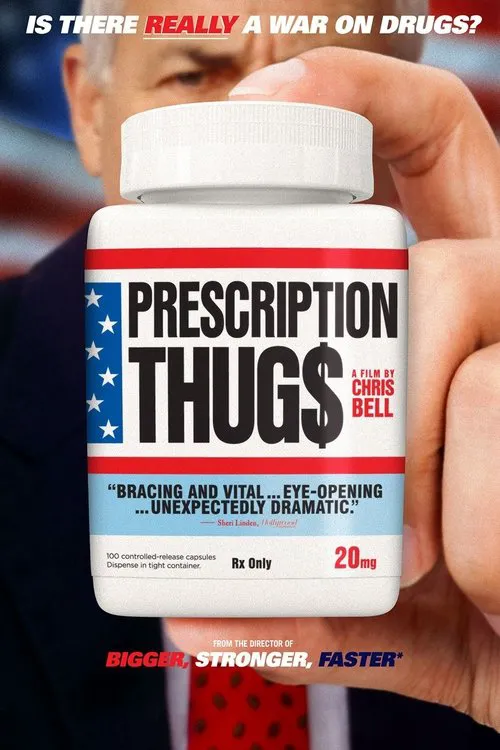Prescription Thugs

Plot
In a nation where healthcare has become a multi-billion dollar industry, the statistics paint a stark picture: Americans account for a staggering 75% of the world's prescription drug consumption. Documentarian Chris Bell was once part of this statistic, but his connection to the ever-growing epidemic of prescription drug abuse went far beyond mere consumerism. The tragic loss of his brother to this insidious addiction was the spark that ignited Bell's quest to demystify this scourge. His investigation would take him down a rabbit hole of corruption, deceit, and ultimately, self-reflection. Bell's journey began with an examination into the motives of the giants that fueled this market: big pharma and the medical establishment. He delved into the world of pharmaceutical corporations, where profits often seemed to take precedence over patient well-being. His encounters with experts in the field revealed a complex interplay between the pharmaceutical industry and the medical community. Doctors, often under pressure from the industry to prescribe newer, more expensive medications, seemed to play a significant role in perpetuating this cycle of addiction. As Bell dug deeper, he met with survivors of prescription drug abuse, their stories a testament to the devastating consequences of addiction. These individuals, often struggling to recover from the ravages of their addiction, revealed a system that prioritized profit over people. Their accounts were chilling, as they recounted the ways in which the medical establishment had failed them, sometimes even enabling their addiction. These stories served as a stark reminder that behind the statistics, there were human beings, torn apart by the very industry that was intended to heal them. One of the most compelling figures Bell encountered was a whistleblower from within the pharmaceutical industry. This courageous individual, who wished to remain anonymous, revealed the shocking tactics employed by big pharma to promote their drugs, often at the expense of patient safety. They spoke of the billions of dollars spent on advertising and lobbying, intended to sway doctors, lawmakers, and the public to accept their products as necessary. The sheer scale of these efforts, they claimed, was designed to create a culture of dependency, where patients were hooked on the very medications meant to cure them. As Bell continued his investigation, he encountered more whistleblowers, each with their own harrowing tale of how big pharma prioritized profits over people. Their stories painted a picture of an industry that was not only driven by greed but also seemingly devoid of conscience. The notion that these corporations were willing to do whatever it took to push their products onto an increasingly unsuspecting public was both alarming and infuriating. But Bell's investigation was not just about exposing the wrongdoings of big pharma and the medical establishment; it was also about confronting his own involvement in this crisis. Through his encounters with experts, survivors, and whistleblowers, Bell began to realize that his brother's addiction had not been an isolated incident. The system that had failed his brother was also the same one that had failed countless others. This realization hit close to home, forcing Bell to examine his own role in perpetuating the cycle of addiction. As he delved deeper into his own family's history, Bell discovered disturbing patterns of behavior. His brother's addiction, he revealed, had not been a sudden, inexplicable event but rather the culmination of years of exposure to prescription medications. Bell's own actions, he confessed, had played a significant role in enabling his brother's addiction. This painful truth shook him to his core, forcing him to confront the extent to which his own family had been complicit in the very system he was investigating. In the end, Bell's investigation was not just about exposing the wrongdoing of big pharma and the medical establishment but also about his own personal journey of self-discovery. His documentary, Prescription Thugs, was a searing critique of an industry that had lost sight of its purpose. It was also a testament to the power of human resilience, as Bell and those he met along the way struggled to overcome the devastating consequences of addiction. Ultimately, Bell's documentary served as a call to action, urging viewers to rethink their relationship with prescription medications. By exposing the dark underbelly of the pharmaceutical industry and the medical establishment, Bell hoped to spark a national conversation about the true cost of prescription drug consumption. The loss of his brother had been a tragedy, but from it, Bell had created something truly remarkable – a powerful indictment of a system that had failed, and a testament to the human spirit's capacity for healing and rebirth.
Reviews
Recommendations




